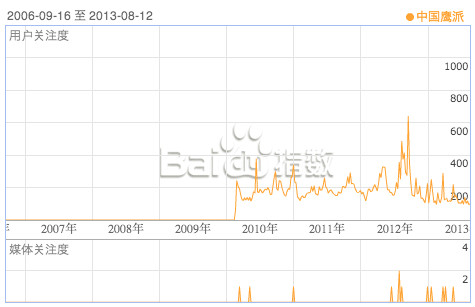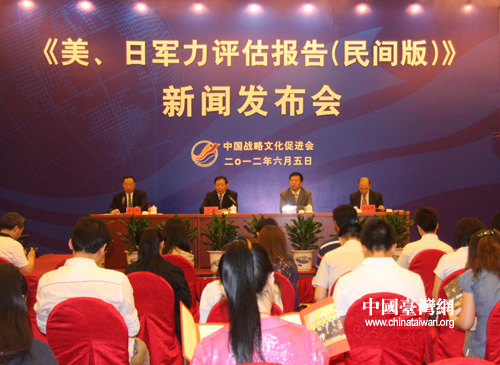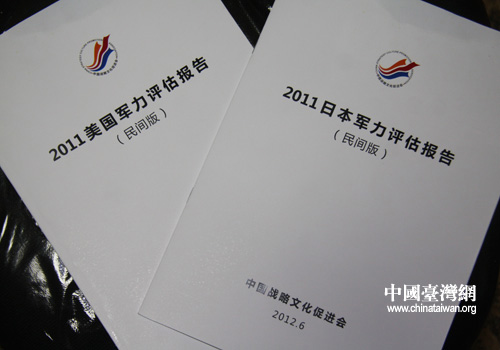Propaganda as Policy? Explaining the PLA’s “Hawkish Faction” (Part Two)
Posted: August 13, 2013 Filed under: Academic debates, Diaoyu, Fake PLA generals?, Global Times, Ministry of Foreign Affairs, PLA & PLAN, South China Sea, State media | Tags: Baidu Index, China-Philippines relations, Chinese foreign policy, Chinese media, Chinese military, Chinese nationalism, Chinese public opinion, 环球网, 环球时报, 罗援, Dai Xu, deterrence, Diaoyu, Diaoyu Islands, 钓鱼岛, 鹰派, 黄岩岛, Global Times, informatized warfare, Jamestown Foundation, Luo Yuan, military propaganda, PLA hawks, propaganda, scarborough shoal, Senkaku, Senkaku Islands, Sino-Japanese relations, south china sea, 忧患意识, 戴旭 3 CommentsHere is Part 2 on the PLA hawkish faction from China Brief, with added links to sources, and a couple of graphs from the utterly awesome Baidu Index (big hat tip to Kaiser Kuo).
I’d also like to add my thanks to Xuan Cheng, John Garnaut, James Barker, Mark Stokes and Taylor Fravel for discussions and tips on this topic. They don’t necessarily agree with the content of the article.
~
Propaganda as Policy? Explaining the PLA’s “Hawkish Faction” (Part Two)
Publication: China Brief Volume: 13 Issue: 16
August 9, 2013
By: Andrew Chubb

Rise of the hawks: searches for “China hawkish faction” by logged-in Baidu users since 2008. I’m requesting further info from Baidu regarding the extremely low pre-2010 numbers. One point that can be made with confidence is that user interest in the “Chinese hawkish faction” peaked during the Scarborough Shoal and (especially) Diaoyu Islands crises.
If outspoken Chinese military officers are, as Part One suggested, neither irrelevant loudmouths, nor factional warriors, nor yet the voice of the People’s Liberation Army (PLA) on foreign policy, and are instead experts in the PLA-CCP propaganda system, then what might explain the bad publicity they often generate for China? This article explores how the activities of China’s military hawks may contribute to the regime’s domestic and international goals. On a general level, the very appearance of a hawkish faction—the “opera” that Luo Yuan has described—serves the domestic purposes of promoting national unity (Global Times, May 4). By amplifying threat awareness and countering perceived Western plots to permeate the psyche of the Chinese populace and army, the “hawks” direct public dissatisfaction with the policy status quo away from the system as a whole.
In specific crises, such as the standoff at Scarborough Shoal last year or in the wake of the Diaoyu Islands purchase, hard-line remarks from uniformed commentators serve to rally domestic public opinion behind the prospect of military action, instil confidence in the PLA’s willingness to fight over the issue and deter China’s adversary. By amplifying the possibility of otherwise irrational Chinese military action and inevitable escalation should Beijing’s actions be interfered with, they have contributed to a thus-far successful effort to convince the Philippines and Japan to accept the new status quo around Scarborough Shoal and the Diaoyu Islands.
Luo Yuan’s US-style military report, and difficulties for Dai Xu
Posted: July 20, 2013 Filed under: PLA & PLAN, Weibo | Tags: China Strategy Culture Promotion Association, Chinese army propaganda, 罗援, 罗援少将, Dai Xu, external propaganda, 龙韬, Long Tao, Luo Yuan, PLA, PLA political work, propaganda, Taiwan Affairs Office, Weibo, 戴旭, 中国战略文化促进会 1 Comment
Press conference launching China Strategy Culture Promotion Association’s 中国战略文化促进会 2011 reports on US and Japanese military developments
Here is an actual weblog post — a log of what one reads on the internet — rather than the usual rambling speculative essay.
Luo Yuan’s think tank, the “China Strategy Culture Promotion Association” (中国战略文化促进会), yesterday released separate reports on the “military power of the US and Japan”.
Curiously, given it’s supposedly an non-governmental think tank (民间智库), the Global Times quoted China Foreign Affairs University’s Su Hao calling the reports “strong and timely responses to the inaccurate remarks in the US annual report on China’s military and the Japanese Ministry of Defense’s recent white paper” (emphasis added).
The report has been given lots of coverage in the Chinese-language media. Chinese radio bulletins yesterday were reporting on the report before it was even released.
The radio also mentioned that this year’s reports will be issued in English. I hope this is true, because it looks to be packed with highlights:
The reports pointed out that neither the US nor Japan had enough transparency regarding their military budgets.
[…]
The report concluded that Japan has strengthened its defense in its southwest islands and was preparing to take over the Diaoyu Islands by force in the future and intervening in any potential conflict in the Taiwan Straits.
Luo Yuan himself was quoted:
“We need to prepare for the worst [situation],” Luo said, adding that China should be well equipped.
This is the second year the think tank has released these reports. Copies of last year’s report carried the term “public version 民间版” on the cover, as pictured at the top, which seems to suggest there also exists some kind of restricted-circulation government version. If so, the China Strategy Culture Promotion Association looks like a good analogue of Luo Yuan’s own roles, at the intersection of military intelligence gathering, public diplomacy, propaganda work, and Taiwan affairs.
Note the watermark on the above pictures, which are taken from the think tank’s own website here. Chinataiwan.org is a website of the PRC State Council Taiwan Affairs Office, which Luo Yuan’s father Luo Qingchang directed in the 1970s and early 1980s.
* * *
I stumbled across a couple of rather astonishing little Dai Xu tidbits a couple of weeks back.
1.) According to China Intellectual Property News, Dai Xu sued a Hong Kong magazine Wide Angle Lens《广角镜》 and others including a Beijing airport newsagent, for lifting 52% of the 2011 Long Tao article calling for a South China Sea war. He demanded withdrawal of the magazine from circulation, apologies, compensation of ¥200,000. Judgement was handed down in January this year. He was awarded……wait for it…….¥240.
Among other things, i guess this shows Colonel Dai is not that well-connected.
2.) A sharp-witted blogger has outed Dai Xu for writing a preface, under his penname “Long Tao”, to his own chapters, in a book edited by him. Of one Dai Xu chapter, “Long Tao” asserts that “this piece can be called the modern-day Strategies of the Warring States 《战国策》” and that “Dai Xu has continued his consistent style of speaking the truth . . . on national strategy, Dai Xu’s viewpoint is deafeningly clear, and manifestly superior”. In the other self-preface, Long Tao says the following article “will receive the support of the majority of Chinese people and Chinese military personnel . . . an incomparably correct position . . . nobody has ever explained important theoretical problems so clearly, correctly, reasonably and vividly”.
Here we see essentially the same self-wumao tactic as Luo Yuan got caught employing on weibo a few months back. A post appeared on Luo’s weibo account, praising Luo Yuan’s superb analysis of the North Korean problem, and declaring him “the most popular military commentator on television”.
The Major General claimed he claimed his account had been hacked, but Kai-fu Lee certainly wasn’t buying it. He did, however, offer Luo some expert advice: “Although you can use different browsers to operate multiple weibo accounts, the premise is that each browser must be logged into a different account!”
Lieutenant-General Wang Hongguang blasts PLA pundits’ “interference” in decisions and deployments
Posted: April 29, 2013 Filed under: China-Japan, Diaoyu, Global Times, PLA & PLAN | Tags: Chinese army propaganda, Chinese foreign policy, Chinese media, Chinese military, Chinese nationalism, Dai Xu, Diaoyu Islands, fire control radar, General Liu Yuan, Huanqiu, Huanqiu Shibao, Liu Yuan, Luo Yuan, Peng Guangqian, PLA, propaganda, radar incident, Senkaku, Wang Hongguang, Xi Jinping, Zhang Zhaozhong 6 Comments[I spent hours on this post, then WordPress kindly lost it without a trace, hence this is a bit out-of-date, sorry]
The April 20 edition of the Huanqiu Shibao (Global Times) carried an article by recently-retired PLA Lieutenant-General Wang Hongguang, directly criticizing the Chinese media’s hawkish military commentators.
The article is brief — indeed so brief that the obligatory preface declaring support for the pundits’ patriotic mission does not even run to a full sentence:
In recent years, military affairs experts have frequently appeared on TV and in all kinds of publications, with the positive effect of strengthening the masses’ national defense awareness and arousing patriotism, but it cannot be denied that some have said off-key things, things that have misled the audience and been irresponsible.
Lt-Gen Wang, who now serves as Vice President of the PLA’s Academy of Military Science, made it quite clear that by “military affairs experts” he was referring to fellow PLA academics, particularly Zhang Zhaozhong, Luo Yuan, and of course Dai Xu.
It’s unusual to hear a PLA academic criticize his comrades in public; even more so for someone of such high rank. But most remarkable was Lt-Gen Wang’s claim that PLA academics’ war talk is “interfering” with the CCP-PLA leadership’s decision-making, citing the specific example of Sino-Japanese relations:
Some experts have inappropriately made comparisons of China and Japan’s military strength, claiming “China and Japan will inevitably go to war”, and that this “would not significantly affect our period of strategic opportunity”, [thus] inciting public sentiment and causing some interference with our high-level policy decision-making and deployments.
Wang Hongguang is in a position to know. Until recently he was Deputy Commander of the PLA’s Nanjing Military Region.






“Public opinion warfare to smear military commentators”: my plot to contain China exposed
Posted: August 1, 2013 | Author: Andrew Chubb | Filed under: Academic debates, Comment threads, Fake PLA generals?, Global Times, PLA & PLAN, Weibo | Tags: Chinese internet, Chinese military, Chinese nationalism, Chinese news portals, 环球网, 环球时报, 罗援, Dai Xu, external propaganda experts, 舆论战, 鹰派, Global Times, hawkish faction, hawkish generals, Huanqiu, military propaganda, Netease, PLA hawks, PRC news portals, propaganda, public opinion warfare, Sohu, 张召忠, 戴旭 | 6 CommentsChina.com special topic: Are the PLA’s hawkish statements just propaganda?
In my first foray into mainland China’s propaganda system since winning a “second-class prize” in a television language competition heavily rigged in my favour, the previous post (written for the Jamestown Foundation’s China Brief) was picked up by mainland online media on Tuesday, and run under headlines including:
I apologize in advance for the infelicitousness of this post, but i am a student and this is a blog, so can’t take these things too seriously 😉
My personal favourite headline was:
Since i now speak for “America” (or is it that i am America?), it is high time i actually went there.
Read the rest of this entry »